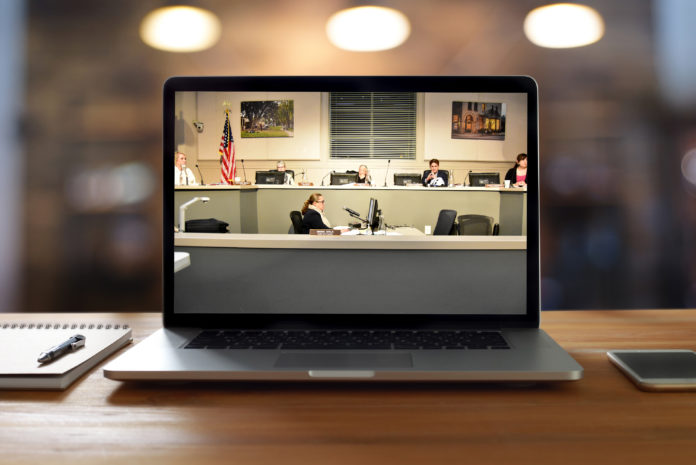
South Pasadena’s first-ever disembodied City Council meeting will take place April 15 as the Council seeks to balance the public’s business with public safety in the time of COVID-19. Council Chambers won’t be open for the public meeting, nor will Council members be physically present. As with recent City Council meetings in Pasadena, Alhambra and San Marino, South Pasadena City Council members will participate remotely via video conference. A closed session will begin at 6:30 p.m. with regular proceedings live-streamed as usual starting at 7:30 p.m. Public comment, normally taken live, will be confined to written comments emailed by 6 p.m. and limited to 150 words, the length of this paragraph. Commenters must specify their name and say whether they are making a general comment or speaking to a specific agenda item—and if so, which one. They also must state whether they want their comment read during the meeting.
The closed session will feature a performance review of controversial City Manager Stephanie DeWolfe, a matter which has also appeared on the Council’s March 18, January 15, September 18, September 11 and August 21 closed session agenda and whose proposed 2.5 percent salary increase repeatedly deferred for over a year..
The abbreviated public meeting will feature no public hearings or action items.
That means after a coronavirus update, the biggest piece of business will be the long-awaited appointments to the newly restructured transportation and public works commissions, whose monthly meetings have been idled since late last year pending the drawn-out restructuring.
Slated for appointment to the newly charged Public Works Commission are Sam Hernandez, Julie Riles, Charles Trevino, Arcelia Arce and David Maling.
Set to serve on the newly formed Mobility and Transportation Infrastructure Commission (MTIC) are Kim Hughes, John Fisher, Lawrence Abelson, Michelle Hammond and Samuel Zneimer.
According to its enabling ordinance, all members of the MTIC must have “knowledge of mobility policy, multi-modal transportation and transportation infrastructure.”
Hughes, Abelson and Fisher had been serving on the expiring Public Works Commission.
The Council’s information packet did not provide details on any of the new appointees or what their qualifications are. But Zneimer is a former South Pasadena city analyst who served as liaison to the transportation commission, is the son of City Clerk Evelyn Zneimer and works now as a senior planner and transportation consultant at Alta Planning + Design in Los Angeles. Hammond, owner of South Pasadena’s Munch Company sandwich shop, previously served on the city’s Community Garden Commission.
Only one member of the terminated Freeway and Transportation Commission, Arcelia Arce, was named to the new MTIC. Generally reflecting the city’s desire to move beyond the 710 Freeway battle, none of the following members of the expiring Freeway and Transportation Commission applied for positions on either commission: Joanne Nuckols, Richard Helgeson and William Sherman, all of whom previously served as city appointees to advisory panels created by Metro in connection with the 710 environmental review.
The length of the terms each new member will serve will be determined during a “public lottery” city staff will undertake after the appointments are approved.
In addition, the Council is slated to appoint Councilman Richard Schneider (3rd District) as its liaison to the MTIC, while Mayor Robert Joe (District 1) will be liaison to the Public Works Commission.
Next on the agenda, Council members and the City Manager will make their presentations, followed by public comment.
The last item will be the consent calendar, a bevy of nine items to be approved or rejected under a single vote, including: approval of nearly $1.8 million in various prepaid and general city warrants; an update to the mayor’s list of commission and regional group appointments; adoption of a simplified version of the new ethics policy for elected city staff and commission members; an extension of up to $37,000 to one of the city’s two personal service contracts for communications services; a temporary relaxation of sign permit requirements pursuant to the COVID-19 emergency; and two exclusive franchise deals for police towing services.
The consent calendar also includes formal filing of a Form 130 with the state’s Office of Emergency Services, a procedural requirement to clear the city’s way to prospective federal and state reimbursement for unspecified amounts of COVID-19-related costs such as staff overtime, needed supplies and revenue losses due to the “safer at home” orders.















.png)






